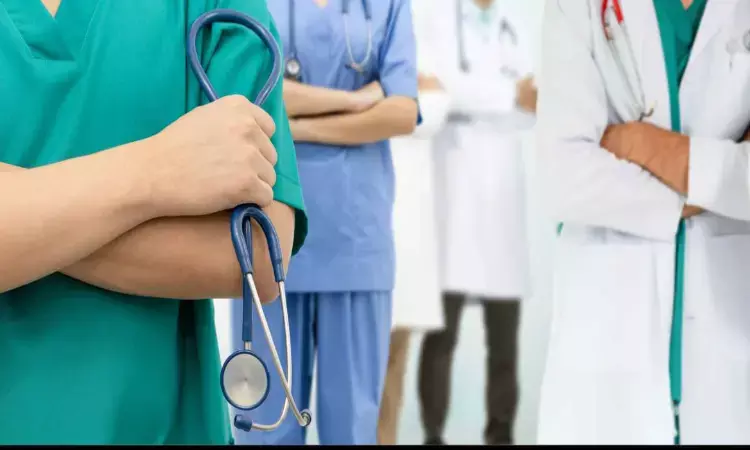- Home
- Medical news & Guidelines
- Anesthesiology
- Cardiology and CTVS
- Critical Care
- Dentistry
- Dermatology
- Diabetes and Endocrinology
- ENT
- Gastroenterology
- Medicine
- Nephrology
- Neurology
- Obstretics-Gynaecology
- Oncology
- Ophthalmology
- Orthopaedics
- Pediatrics-Neonatology
- Psychiatry
- Pulmonology
- Radiology
- Surgery
- Urology
- Laboratory Medicine
- Diet
- Nursing
- Paramedical
- Physiotherapy
- Health news
- Fact Check
- Bone Health Fact Check
- Brain Health Fact Check
- Cancer Related Fact Check
- Child Care Fact Check
- Dental and oral health fact check
- Diabetes and metabolic health fact check
- Diet and Nutrition Fact Check
- Eye and ENT Care Fact Check
- Fitness fact check
- Gut health fact check
- Heart health fact check
- Kidney health fact check
- Medical education fact check
- Men's health fact check
- Respiratory fact check
- Skin and hair care fact check
- Vaccine and Immunization fact check
- Women's health fact check
- AYUSH
- State News
- Andaman and Nicobar Islands
- Andhra Pradesh
- Arunachal Pradesh
- Assam
- Bihar
- Chandigarh
- Chattisgarh
- Dadra and Nagar Haveli
- Daman and Diu
- Delhi
- Goa
- Gujarat
- Haryana
- Himachal Pradesh
- Jammu & Kashmir
- Jharkhand
- Karnataka
- Kerala
- Ladakh
- Lakshadweep
- Madhya Pradesh
- Maharashtra
- Manipur
- Meghalaya
- Mizoram
- Nagaland
- Odisha
- Puducherry
- Punjab
- Rajasthan
- Sikkim
- Tamil Nadu
- Telangana
- Tripura
- Uttar Pradesh
- Uttrakhand
- West Bengal
- Medical Education
- Industry
255 Specialist doctors appointed to Govt Hospitals in Punjab

Doctors
Ludhiana: In a major step to boost Punjab's healthcare infrastructure, the state government has assigned stations and postings to 255 doctors under the bonded government service program. These doctors, who have recently completed their Postgraduate (PG) courses, will be deployed across various public healthcare institutions in the state to help address critical gaps in healthcare services.
Medical Dialogues had previously reported that the healthcare system in Punjab is grappling with a severe shortage of doctors, as only 11 out of the 17 doctors recently allotted to the district have joined their duties so far. This gap has resulted in unmet medical needs for the local population.
Also Read: Doctor Shortage Hits Healthcare Services in Punjab
The PCMCA in a press release said, "In the background of the current specialist doctors shortage and tepid responses to the walk-ins in interviews in the recent past, moves like this are the need of the hour, as the services provided by these young specialist doctors in the near future will eventually benefit the poor and the needy. "
The notification issued by the health department specifies that the specialists include 36 physicians, 35 surgeons, 25 gynaecologists, 24 anaesthesiologists, 19 orthopedists, 16 otolaryngologists (ENT specialists), and eight paediatricians. These doctors are drawn from various government medical colleges in the state, including those in Patiala and Amritsar, as well as the Guru Gobind Singh Medical College and Hospital in Faridkot.
According to the Hindustan Times, doctors welcomed the decision to address the shortage of doctors. “Such a move is the need of the hour amid a shortage of specialist doctors and tepid responses to the recent walk-in interviews. The services of these young specialist doctors will eventually benefit the poor and needy,” the Punjab Civil Medical Services Association (PCMSA) mentioned in a statement.
Also Read: Punjab doctors end strike after State Government's assurance
The association also highlighted that this current move coupled with another round of walk-in interviews for specialist doctors should potentially address the issue of specialist doctors shortage, thereby ensuring seamless specialist services across the state.
aimed at further tackling the shortage of medical professionals.
Speaking to Hindustan Times, PCMSA state president Dr Akhil Sareen said, “The bond has always been there but it was not enforced. After Covid when the shortage of doctors was felt hard, the department started posting postgraduates from government medical colleges in medical colleges itself. This is for the first time they have been posted to peripheral facilities, like the district hospitals and community health centers.”


